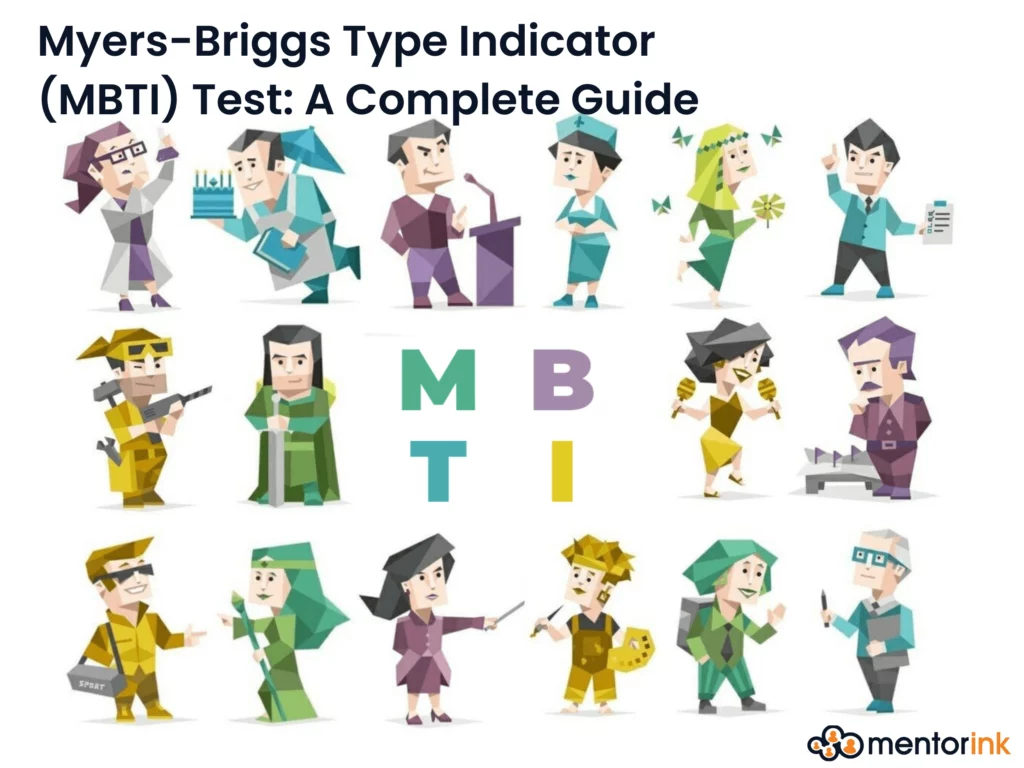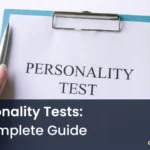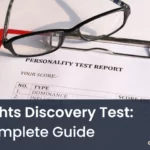
It is a known truth that the collection of personality traits we have are the values that make us who we are. Our attitudes and behaviors in the face of events are actually a part of our personality. There are many personality tests that allow us to have a certain knowledge about the personality traits of individuals. The most famous of these tests is known as The Myers-Briggs Type Indicator (MBTI).
The Myers-Briggs Type Indicator (MBTI) test is one of the most popular personality assessments in the world. The Myers-Briggs Type Indicator (MBTI) test is a tool that helps people understand their personal style and behaviors. It’s been used in both personal and professional settings to improve team dynamics, leadership development, and even hiring decisions.
What Is the Myers-Briggs Type Indicator (MBTI) Test?
The Myers-Briggs Type Indicator (MBTI) is a self-report questionnaire that helps people identify their personality type based on psychological preferences.
The Myers-Briggs Type Indicator (MBTI) was developed by Katherine Cook Briggs and her daughter Isabel Briggs Myers during World War II. It’s based on Carl Jung’s theory of psychological types. Carl Jung’s personality theory focuses on how the conscious and unconscious minds work together, universal archetypes, the process of becoming your own person, and psychological types.
The combination of MBTI brings 16 personalities to analyze human character. Those types can be categorized like this;
1. Extraversion (E) vs. Introversion (I) – how you interact with the world and where you derive your energy from.
2. Sensing (S) vs. Intuition (N) – how you prefer to take in information.
3. Thinking (T) vs. Feeling (F) – how you make decisions.
4. Judging (J) vs. Perceiving (P) – how you approach the external world and structure your life.
The combination of these inclinations generates one of 16 personality types, each of which provides insights into how people view the world and interact with others. For example, a “ENTJ” is likely to be extroverted, intuitive, thinking, and judging, indicating a preference for leadership, strategy, and decisiveness.
How Does the MBTI Test Work?
The MBTI test functions by asking a series of multiple-choice questions to determine an individual’s preferences in the four areas. The test is not about correct or incorrect responses, but about determining the respondent’s innate tendencies.
During the test, participants should answer those types of questions;
• Do you prefer to focus on the outer world or your inner world? (Extraversion vs. Introversion)
• Do you tend to focus on facts or possibilities? (Sensing vs. Intuition)
• Do you make decisions based on logic or personal values? (Thinking vs. Feeling)
• Do you prefer to plan things out or remain open to new information and possibilities? (Judging vs. Perceiving)
When the test is finished, your responses are assessed, and you are assigned a four-letter personality type. This finding establishes a framework for comprehending your motivations, behaviors, and interactions with the world.
However, it is very important that your answers are consistent throughout the test in order to reach a correct result. Therefore, it is possible that you may encounter similar questions while solving the test. In addition, being clear in your answers while answering the test also contributes significantly to the complete result.
What Is the Format of the MBTI Test?
The MBTI test usually has a simple, self-assessment format with multiple-choice questions, and there’s no time limit for completion. The test can be taken online or on paper, depending on who’s running it, and it usually takes about 20 to 30 minutes.
Most versions of the MBTI test feature between 90 and 120 questions that ask respondents to choose between two statements that best describe their preferences. For example:
• “I prefer to work alone” vs. “I prefer to work with others”
• “I like concrete facts” vs. “I enjoy thinking about abstract concepts”
The purpose of these questions is to evaluate an individual’s innate preferences and tendencies, not their conditioned actions. If you want an accurate read on your personality type, be truthful when answering the questions. Participants get their four-letter personality type and an explanation of how it impacts their behavior, decision-making, and interactions with others after finishing the exam.
MBTI Test Personality Types
When you complete your MBTI test, you will be given a four-letter personality code. Each code has its own characteristics. The 16 personalities test that the test offers you can be described as follows;
1. ISTJ (The Inspector) – Practical, Fact-Driven, Responsible, and Organized
ISTJs can be counted on to get the job done. They like to have a plan and like things to be organized. They’re known for being loyal and having a strong sense of duty, and they do well in environments where the rules and procedures are clearly defined. ISTJs are often very detail-oriented and take their responsibilities seriously, which makes them ideal for roles that require precision and reliability. They like to focus on the facts and evidence, and they’re more comfortable dealing with the present than speculating about the future. On the other hand, they can sometimes be reluctant to embrace change or make decisions on the fly.
2. ISFJ (The Protector) – Warm, Empathetic, and Dedicated to Meeting the Needs of Others
ISFJs are compassionate, considerate individuals who take pleasure in helping others and ensuring everyone’s well-being. Often known as caregivers, they are incredibly attentive to the needs of others and excel at creating a supportive and harmonious environment. ISFJs value tradition, loyalty, and hard work, making them dedicated to their tasks, especially when it comes to protecting or nurturing others. Their empathy and attention to detail make them exceptional in caregiving roles, but they can sometimes overextend themselves, prioritizing others’ needs at the expense of their own well-being.
3. INFJ (The Advocate) – Visionary, Idealistic, and Motivated by Helping Others
INFJs are deep thinkers with a strong sense of intuition and a desire to make the world a better place. They are driven by their principles and often have a vision of how things should be, working tirelessly to turn their ideals into reality. INFJs are highly empathetic and insightful, often able to understand others’ emotions and motivations with ease. Their ability to connect with people on a deep emotional level makes them excellent mentors and counselors. However, their perfectionism and tendency to take on too much responsibility can lead to burnout if they don’t set personal boundaries.
4. INTJ (The Architect) – Strategic Thinkers, Focused on Long-Term Goals and Innovation
INTJs are analytical, independent, and always thinking several steps ahead. Known for their strategic minds, INTJs excel in planning and executing long-term projects. They are highly logical and prefer to work in structured, goal-oriented environments. INTJs are innovative problem-solvers, often coming up with unique solutions to complex issues. They value efficiency and competence and tend to focus on the “big picture” rather than getting bogged down by details. However, their intense focus on logic can sometimes come across as cold or dismissive of others’ feelings.
5. ISTP (The Virtuoso) – Analytical, Adaptable, and Interested in Problem Solving
ISTPs are highly skilled at working with tools, machines, or anything that requires practical problem-solving. They enjoy hands-on tasks and have a knack for figuring out how things work. ISTPs are independent, adaptable, and quick to respond to situations that require immediate action. They value autonomy and often prefer to work alone, taking a spontaneous and flexible approach to life. While they are typically calm and rational, they may struggle with emotional expression, leading others to see them as detached.
6. ISFP (The Adventurer) – Flexible, Spontaneous, and Deeply in Touch with Their Surroundings
ISFPs are gentle, artistic, and live in the present moment. They are highly in tune with their senses and often find beauty in the world around them. Creative and spontaneous, ISFPs enjoy exploring new experiences and are driven by their internal values rather than external expectations. They are empathetic and compassionate, often choosing careers or hobbies that allow them to express their artistic side or care for others. However, their dislike for conflict and structure can sometimes cause them to shy away from leadership roles or difficult decisions.
7. INFP (The Mediator) – Idealistic, Empathetic, and Driven by Personal Values
INFPs are introspective and imaginative, deeply connected to their inner values. They are idealists who often seek meaning and purpose in everything they do, focusing on how they can contribute to the greater good. INFPs are compassionate and non-judgmental, making them natural peacemakers and counselors. They have a rich inner life and are often drawn to artistic or creative pursuits. While they are great at understanding others’ emotions, their idealism can sometimes lead to disappointment when reality doesn’t match their high expectations.
8. INTP (The Thinker) – Logical, Innovative, and Constantly Seeking Understanding
INTPs are analytical and curious individuals who enjoy exploring new ideas and theories. They are natural problem-solvers who love to engage in abstract thinking and are often drawn to academic or scientific fields. INTPs are independent and prefer working in environments that allow for autonomy and intellectual exploration. They value logic and reason above all else, which can sometimes make them appear detached from emotional concerns. INTPs excel at finding creative, out-of-the-box solutions but may struggle with implementing their ideas or following through with projects.
9. ESTP (The Entrepreneur) – Bold and Action-Oriented
ESTPs are energetic and action-oriented, often thriving in fast-paced environments. They enjoy taking risks and tend to be resourceful when faced with challenges. ESTPs are excellent at thinking on their feet and are skilled at reading people and situations quickly. They are sociable, outgoing, and love to be in the center of the action. While their spontaneity and confidence make them great in crisis situations, they can sometimes act without fully considering the long-term consequences of their decisions.
10. ESFP (The Entertainer) – Outgoing, Energetic, and Lives in the Moment.
ESFPs are lively, fun-loving individuals who thrive on social interaction and excitement. They are natural performers who enjoy being the center of attention and bringing joy to those around them. ESFPs live in the present moment and are deeply attuned to their surroundings, making them great at appreciating life’s simple pleasures. However, their focus on the present can sometimes cause them to overlook future planning or long-term consequences. While they are compassionate and empathetic, they may avoid serious or negative situations, preferring to keep things lighthearted.
11. ENFP (The Campaigner) – Enthusiastic, Imaginative, and Loves Exploring Possibilities
ENFPs are free-spirited, optimistic individuals who are passionate about their beliefs and values. They are driven by their curiosity and are always looking for new experiences, ideas, and opportunities. ENFPs are great at inspiring others and are known for their infectious enthusiasm. They excel at connecting with people and enjoy exploring new possibilities. However, their tendency to be easily distracted or overly idealistic can make it difficult for them to follow through on projects.
12. ENTP (The Debater) – Inventive, Curious, and Enjoys Intellectual Challenges
ENTPs are quick-witted, clever, and love engaging in debates or intellectual discussions. They are constantly seeking new challenges and enjoy pushing the boundaries of what’s possible. ENTPs thrive on innovation and are great at coming up with creative solutions to problems. However, their love of debate can sometimes make them seem argumentative or insensitive to others’ feelings. While they excel in generating new ideas, they may struggle with the more practical aspects of execution or follow-through.
13. ESTJ (The Executive) – Organized, Logical, and Excels in Management and Leadership
ESTJs are natural-born leaders who value structure, order, and efficiency. They are practical, logical, and enjoy taking charge of situations. ESTJs are highly organized and prefer environments where rules and procedures are clear. They excel at managing teams and ensuring that tasks are completed on time and to the highest standard. However, their focus on logic and rules can sometimes make them rigid or unwilling to adapt to new approaches.
14. ESFJ (The Consul) – Harmonious, Supportive, and Values Tradition and Cooperation
ESFJs are warm, caring individuals who value harmony and cooperation. They are excellent at organizing social events and are often the “glue” that holds groups together. ESFJs are deeply committed to maintaining relationships and are known for their generosity and willingness to help others. They value tradition and often prefer environments that are stable and predictable. However, their focus on harmony can sometimes lead them to avoid conflict or suppress their own needs to maintain peace.
15. ENFJ (The Protagonist) – Charismatic, Inspiring, and Helping Others Achieve Their Potential
ENFJs are natural leaders who are highly attuned to the emotions and needs of others. They are compassionate, supportive, and excel at inspiring and motivating people to reach their full potential. ENFJs are often involved in causes that align with their values and have a strong sense of responsibility toward others. They are excellent communicators and can quickly build rapport with those around them. However, their desire to help others can sometimes lead them to neglect their own needs.
16. ENTJ (The Commander) – Confident, Decisive, and Natural-Born Leaders
ENTJs are assertive, strategic leaders who excel at setting goals and driving progress. They are highly organized, decisive, and thrive in environments that require strong leadership and direction. ENTJs are natural problem-solvers who enjoy tackling challenges head-on. They value efficiency and are often focused on achieving long-term success. While their confidence and ambition are admirable, they can sometimes come across as domineering or insensitive to others’ emotions, especially when focused on their goals.
What Are the Advantages of the MBTI Test for Employees?
The Myers-Briggs Type Indicator (MBTI) is an asset for companies and their employees since it improves productivity, collaboration, and communication and also employee management:
Improved Cooperation Within Teams
Employees are better able to compensate for one another’s shortcomings when they have a firm grasp of the several personality types that exist in the workplace. Better collaboration and fewer disagreements result from teams’ increased ability to understand and value one another’s unique viewpoints. If you are familiar with the MBTI types of people you work with, you may adjust your relationships with them to their individual preferences.
Better Management and Leadership
Taking the MBTI can help executives and managers understand their teams better and find ways to inspire them to do their best. Managers can better understand their employees’ unique work habits, which in turn allows them to delegate duties more efficiently and encourages the growth of their team members. Our blog content about “ What are Employee Resource Groups?” can also help you to manage your team.
Career Development
Employees can learn more about their own personal strengths and development opportunities by reviewing their MBTI results and they can build their career development better. If you are aware of your MBTI character type, you can use that information to discover work that suits your interests and strengths.
Better Communication at Workplace
Employees can benefit from taking the MBTI since it provides insight into one’s own communication style and how to adapt it for use with people of diverse personalities. As a result, everyone is able to understand one another better at work.
Is the MBTI Test Considered Valid?
Although the MBTI test has been in widespread use for a long time, there has been continuous discussion regarding its validity. Being one of the most widely used personality tests, it has its share of ardent defenders and detractors. Positively, a lot of people find the MBTI to be very helpful for team-building activities, leadership development, and personal growth.
Because it provides an organized approach to comprehending personality variations and their impact on behavior, a lot of companies use it in their hiring and training processes. The test can offer insightful information on how people approach their work, decide what to do, and communicate with others.
On the other hand, the MBTI test has been criticized for lacking scientific validity.
People who are against the test say that because personality traits can change over time, the test results might not always be reliable.
Moreover, the MBTI may oversimplify the complexity of the human personality by using a binary system that forces people to choose between dichotomies like extraversion and introversion.
In short, the MBTI is still considered as a handy tool for personal and professional growth, even if it isn’t the most scientifically proven method.


